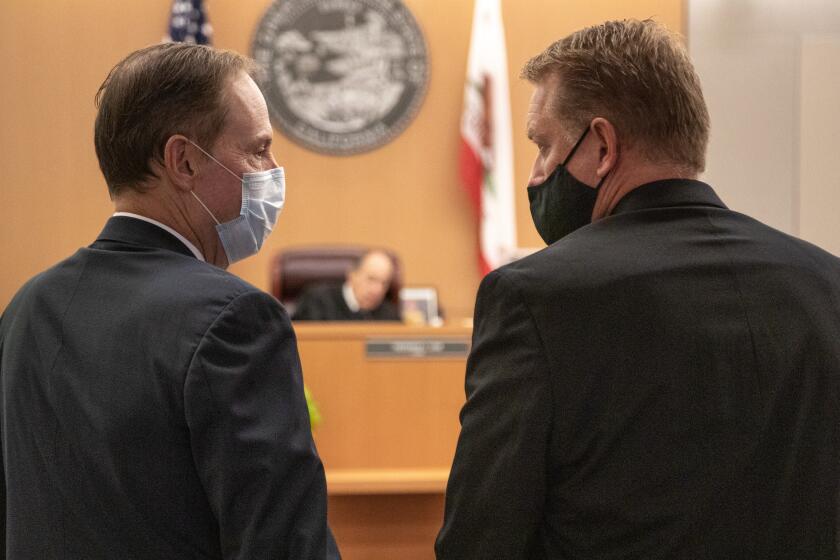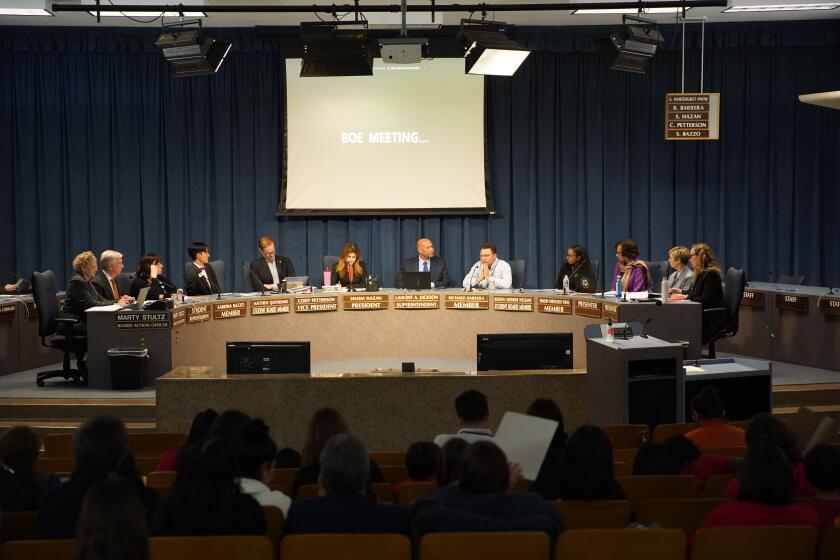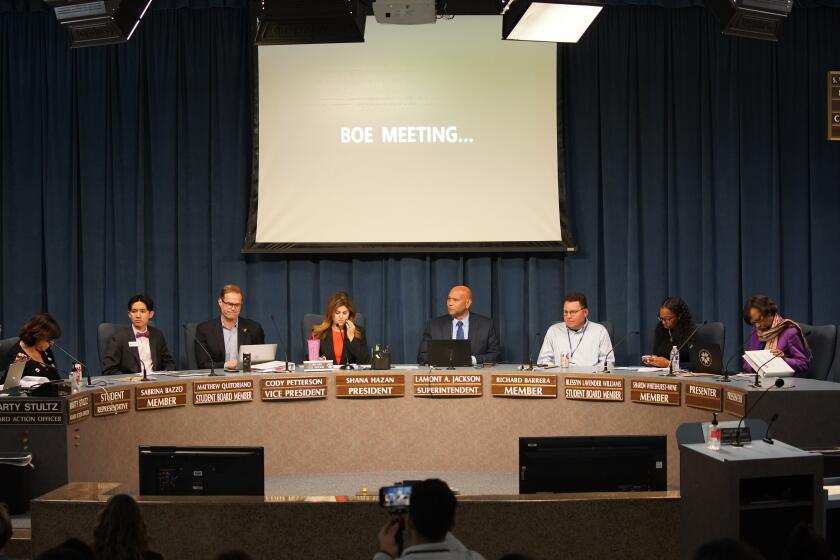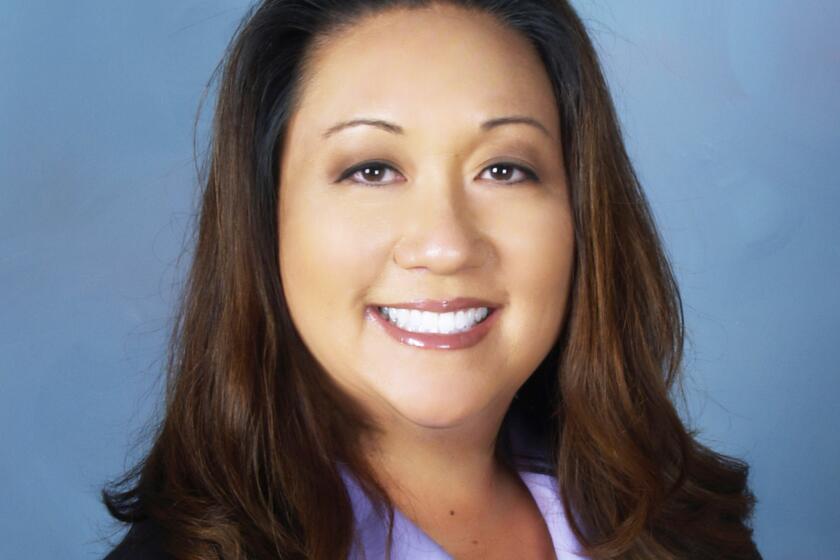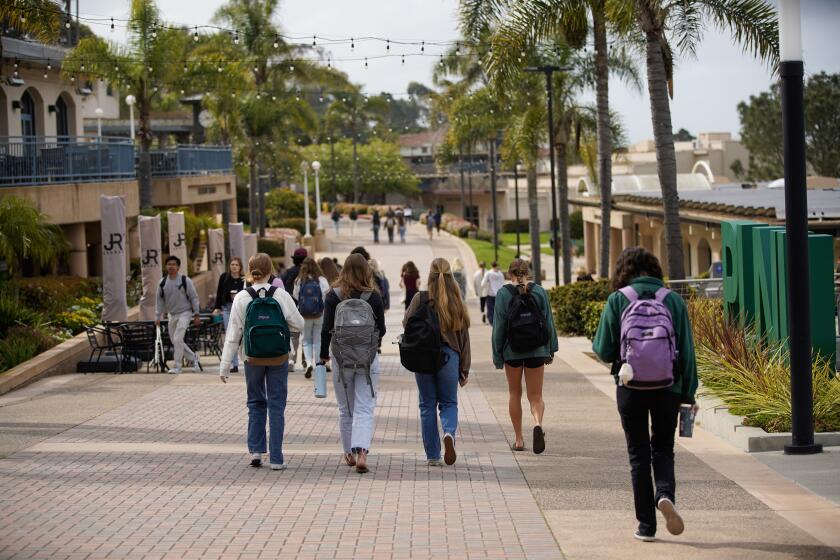School suspended black student for insubordination after wearing braids
Mater Dei High School leaders relented Monday, saying student can return to classes without having to change his hair
A sophomore at Mater Dei High School who is of mixed race was suspended and told to cut his braided hair on Wednesday because it was out of compliance with school dress code.
He was given an in-school suspension for “arguing and insubordination” after he questioned the order, said his mother, Melissa Harden.
Harden’s son missed three days of school because he would not cut his hair, which was above the collar but fell below his eyebrows.
“My son has the right to not cut his hair. He has beautiful hair,” Harden said.
After the incident was publicized on social media, school leadership spoke with Harden Monday afternoon and told her they will allow the student to return to school Tuesday and that he does not have to make any changes to his hair.
The school also is removing the suspension from his record.
Mater Dei is a Catholic high school in Chula Vista where yearly tuition costs $17,080. School leaders referred all questions about the incident to the Diocese of San Diego for comment.
“I think everything is resolved to everybody’s satisfaction,” diocese spokesman Kevin Eckery said. He declined to elaborate further.
Mater Dei’s is one of several cases around the country in which black students were told to cut their hair or were punished for the way their hair looks.
One of the more prominent cases happened in 2018, when a black high school wrestler in New Jersey was forced to cut his dreadlocks minutes before a match because he was told they violated wrestling rules. Videos of that haircut were shared thousands of times on social media.
In July California became the first U.S. state to ban racial discrimination based on hairstyle and hair texture in all public K-12 schools and all workplaces. The law went into effect Jan. 1.
New York and New Jersey have since passed similar laws.
California’s new law does not apply to private school students like Harden’s son, however.
Tasha Williamson, a local activist and mayoral candidate, called attention to the student’s case on social media. She called for all private schools in San Diego County to end hair-based discrimination.
“We understand that this is a broader issue than braids. It is an issue of cultural sensitivity, of rules being used in discriminatory ways,” Williamson wrote in a Facebook post Friday.
Harden said she did not understand why her son was punished because he has had the same length of curly hair since he started at Mater Dei in 2018. It wasn’t until last week, she said, when he showed up to school with braids, that he was punished for his hair.
The school’s assistant principal for student safety and discipline, Michael Inzunza, ordered Harden’s son to cut his hair based on school rules that boys’ hair cannot be longer than mid-ear on the sides, it can’t touch their shirt collars in the back, nor can it go past their eyebrows in the front, according to a school email. The school’s dress code regulates hair length only for boys.
Harden said she had seen photos of other male students with long hair on the school’s website and on social media.
“Was it too ethnic, was it too cultural for them?” Harden said of the braids. “It is discrimination. They discriminated against my son, and they harassed my son.”
Schools have suspended students or otherwise kept them out of school for violating dress codes with rules such as not having their shirts tucked in, not wearing the proper shirt or not wearing a belt, which one professor thinks are “silly” reasons for punishment.
“I think it’s silly to put kids out of school for uniforms, for hair grooming practices,” said Adrienne Dixson, an education professor at University of Illinois Urbana-Champaign who studies racial equity and urban education. “As folks get older, you know, you want to be able to express your individuality.... Why is it the business of schools to kind of kill that in kids, or deter that kind of exploration in kids?”
When school officials write dress codes, they typically are trying to prevent what they believe are distractions to the learning environment, Dixson said. But what defines a “distraction” is subjective.
“It lends itself to discrimination,” Dixson said.
Experts have said dress code rules tend to be disproportionately enforced upon black students, as are rules regulating student behavior, due to implicit bias or lack of cultural competence. Activists say that such rules become ways to exclude students of color from school.
In California, black public school students have the highest suspension rate of any racial group. They are suspended at a 9 percent rate, which is three times that of white students.
Wednesday wasn’t the first time Harden’s son has been cited for violating the dress code, according to Harden.
She says he has been “singled out” by Inzunza for not wearing a tie with his cardigan on Mass days, wearing his school football jacket, wearing the wrong color socks and wearing khakis that looked too tight — even when other students had done the same, Harden said.
Dress code enforcement can become discriminatory when school leadership lacks representation by people of color, Dixson said, and where there’s a lack of sensitivity about the nuances of different cultures’ hair grooming practices.
“For black girls in particular, there’s a whole thing around hair and taking care of your hair. White people don’t have to think about that,” she said.
“I don’t think they set out, necessarily, to be discriminatory,” Dixson said of schools. “I think with the absence of certain perspectives, they become exclusionary.”
Get Essential San Diego, weekday mornings
Get top headlines from the Union-Tribune in your inbox weekday mornings, including top news, local, sports, business, entertainment and opinion.
You may occasionally receive promotional content from the San Diego Union-Tribune.


